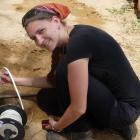
Programme Officer
Mélanie is a water and sanitation engineer working in the WASH sector since 2002. She worked 5 years in the private sector in hydraulic design and construction followed by 7 years in the humanitarian and development sector. Mélanie has an extensive field experience as WASH programme manager and coordinator mainly in emergency contexts, and was based and worked in various countries in Africa, Asia and the Middle East.
She joined IRC in 2012 as a Programme Officer and has been involved in various research and monitoring initiatives, mainly in the field of sanitation, hygiene and MUS (Multiple Use of water Services). Mélanie is the facilitator of the online life-cycle costing training and is working with UNCHR to adapt the life-cycle cost approach to emergency contexts.
Languages: English, German, French, Spanish
While a high proportion of people In Ethiopian have access to improved water and sanitation services, only a small minority receive services that... Read more...
Even in the worst case scenario, the benefits of mutliple use water services outweigh the costs at both household and system levels Read more...
The process, benefits, challenges, and learnings of water safety planning (WSP) in an Ethiopian district, using a mixed method approach and a six-... Read more...
This document chronicles the establishment of water safety planning teams in South Ari Woreda and four pilot kebeles within the woreda, the... Read more...
In Ethiopia, prioritising access to groundwater, supported by responsive and proactive operation and maintenance, increases rural water supply... Read more...
This report summarises the strengths of the decentralised local systems that deliver services in two locations in Ethiopia, describing key actors,... Read more...
Baseline assessment report on rural water service levels in Mile, Afar and South Ari, SNNPR. Read more...
Neither rural sustainability checks, nor urban benchmarking frameworks, are entirely suitable for monitoring small town water services. Read more...
This paper presents findings on water and sanitation service levels from 16 small and medium towns in four regions of Ethiopia. Read more...
This book is an introduction to the theory of water governance and its practical application especially in The Netherlands. Read more...
This factsheet presents a summary of the key findings relating to water supply, sanitation and hygiene infrastructure and the services received by... Read more...
This factsheet presents a summary of the key findings relating to water supply, sanitation and hygiene infrastructure and the services received by... Read more...
This factsheet presents a summary of key findings relating to water supply, sanitation and hygiene infrastructure and the services received by... Read more...
This factsheet presents a summary of the key findings relating to water supply, sanitation and hygiene infrastructure and the services received by... Read more...
Poster presented at the 2015 UNC water and health conference. Read more...
This case study examines how the Multiple Use water Services (MUS) approach was applied in Kalu to develop joint domestic water supply and irrigation... Read more...
The Millennium Water Alliance Ethiopia Programme (MWA-EP) has experimented with the Multiple Use water Services (or MUS) approach to improve water... Read more...